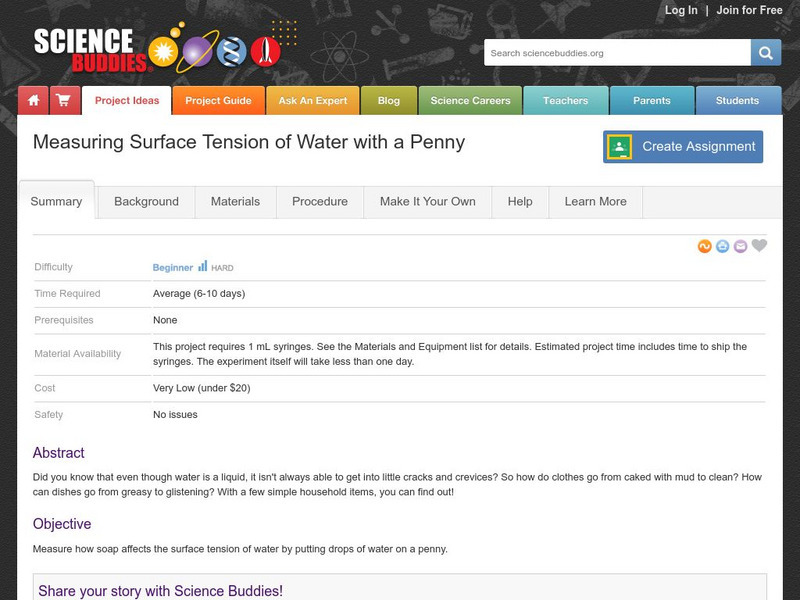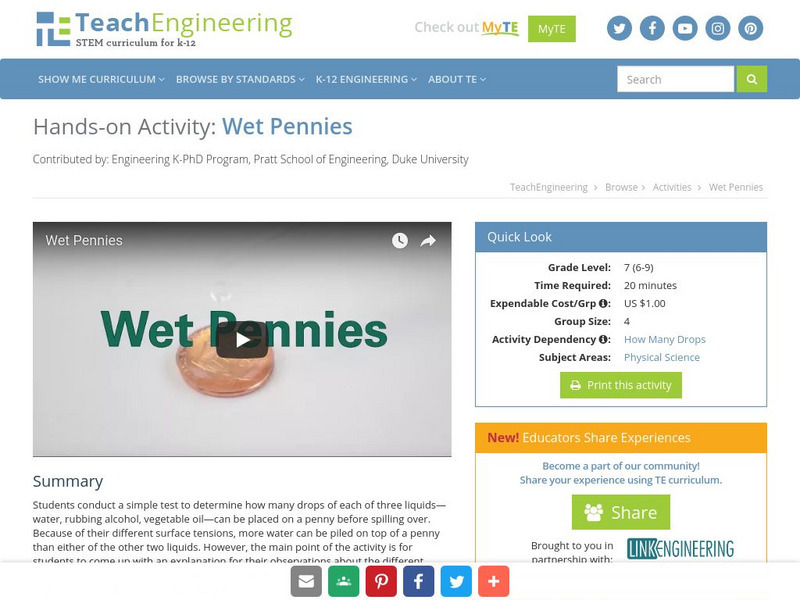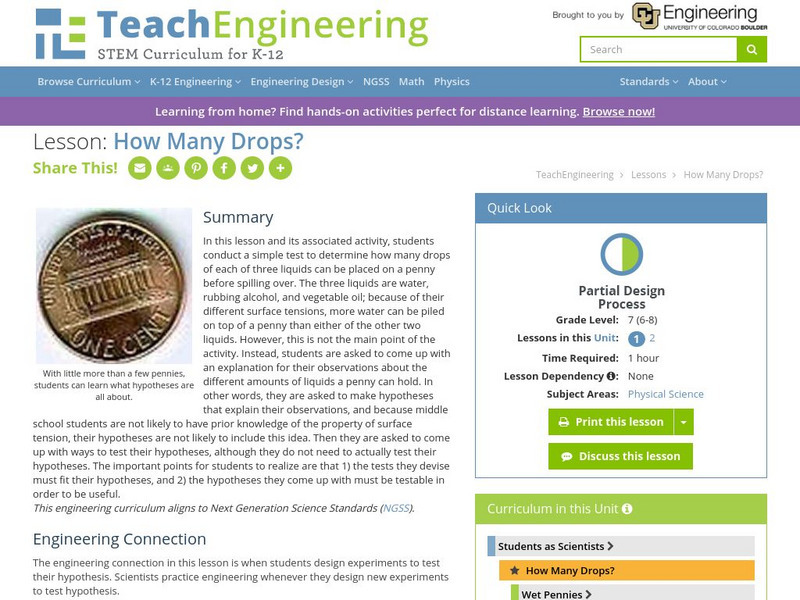American Chemical Society
Surface Tension
A drop of dew holds a sphere shape even when sitting on a seat thanks to the surface tension of water. Learners observe the phenomena of surface tension in water. Through demonstrations, hands-on activities, and discussions they explore...
Curated OER
Fun with Surface Tension!
Students explore physical science by participating in a water properties experiment. In this surface tension lesson, students utilize pennies, water, a dropper and soapy water to test the different surface tensions with numerous objects....
Teach Engineering
Penny Perfect Properties (Solid-Liquid Interations)
I can get more water to stay on a penny than you can! Collaborative pairs determine the volume of liquids that can be contained on the surface of copper pennies and plastic coins. The pairs analyze their results using graphs and go on to...
Curated OER
Wet Pennies
Students conduct a simple test to determine how many drops of water, rubbing alcohol and vegetable oil can be placed on a penny before spilling over. They consider how varying surface tensions allow for different amounts of each liquid...
Curated OER
Drops on a Penny
In this surface tension worksheet, students predict how many drops of water they can put on a coin. They test their hypothesis and repeat their experiment three times. They record their data and average their trials.
Curated OER
How Many Drops of H2o Can Fit on a Penny?
In this properties of water worksheet, students explore the surface tension and cohesion properties of water compared to other liquids in a 2 part experiment.
Curated OER
Surface Tension
Students examine the concept of surface tension. In this surface tension lesson students complete several experiments to allow them to better understand surface tension.
Curated OER
Surface Tension On Coins
Students drop water onto clean coins to determine the tension of each coin and then to graph their findings.
Curated OER
How Many Drops?
Seventh graders hypothesize about the number of drops of liquid that can be placed on a penny before it spills over. They examine both the concept of devising a hypothesis and the idea of surface tension. They determine the difference...
Curated OER
Take a Dip: Sticky Water
Students complete lab activities to investigate the "sticky" properties of water, such as surface tension and capillary action, due to the polarity of the molecules.
Curated OER
Barge Building: What Floats Your Boat?
Students construct aluminum foil boats that float while holding the greatest number of pennies. They investigate the concept of water displacement, record their results, and watch a Bill Nye video on buoyancy.
Illinois Valley Community College
STEM Activities for Middle School Students
Use STEM activities within the class to provide connections to concepts. The resource includes activities that range from working with buoyancy to building rockets and launching them. Other activities involve the engineering design...
Curated OER
How Many Drops?
Learners conduct a simple test to determine how many drops of each of three liquids can be placed on a penny before spilling over. They come up with an explanation for their observations about different amounts of liquids a penny can hold.
Science Buddies
Science Buddies: Measuring Surface Tension of Water With a Penny
Have you ever wondered what makes water 'bead' up on a freshly waxed car? In this project you'll investigate the chemistry of surface tension by measuring how many drops of water a penny can hold.
Middle School Science
Middle School Science: "Sinkin' Lincoln" Lab (Lesson Plan)
In this lesson plan site, students will "Define surface tension, determine what factors affect surface tension, and collect data on how many drops of water a penny can hold."
TeachEngineering
Teach Engineering: Wet Pennies
Students conduct a simple test to determine how many drops of each of three liquids can be placed on a penny before spilling over. The three liquids are water, rubbing alcohol, and vegetable oil; because of their different surface...
TeachEngineering
Teach Engineering: How Many Drops?
For this lesson and its associated activity, students conduct a simple test to determine how many drops of each of three liquids can be placed on a penny before spilling over. The three liquids are water, rubbing alcohol, and vegetable...
TeachEngineering
Teach Engineering: Students as Scientists
This curricular unit contains two lessons that let students actually do the work of scientists as they design their own experiments to answer questions they generate. In the first lesson and its associated activity, students conduct a...

















